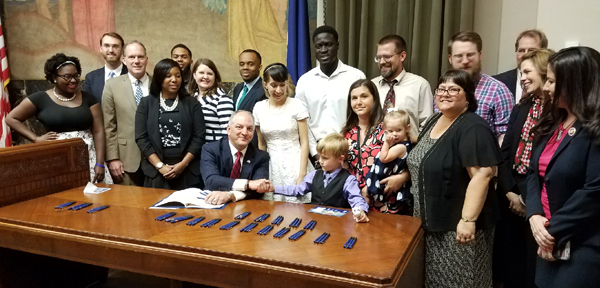
Autistic son was physically restrained in Baton Rouge, but mother calls Luling Elementary a blessing
Allison Badgerow was so ready to comment on state Rep. Franklin Foil’s House Bill 69 aimed at banning corporal punishment for special needs students that she overcame her fear of public speaking to recount her autistic son’s traumatic experience.
“I knew my story would have an effect,” Badgerow said. “Everyone was kind of blown away. My son lost an entire 1-1/2 years of learning because of the physical restraining they were doing.”
While legislators rejected a measure that would have banned corporal punishment for all public school students, it passed Foil’s bill. The measure initially shielded students with disabilities and ADHD, and then it was expanded by the Senate to also include students with attention deficit hyperactivity disorder.
Foil’s bill was among Gov. John Bel Edwards priorities for the session. It was also behind Foil’s push for the measure.School corporal punishment typically refers to causing deliberate pain or discomfort in response to undesired behavior by students in schools. It often involves striking the student across the buttocks or hands with an implement like a paddle or yardstick. But, for special needs children, the punishment can represent restraint.
On April 26, as Badgerow stood on the footsteps of the Louisiana Capitol for annual Disability Rights Day to appeal to legislators about the multiple issues facing disabled children, she got the opportunity to explain what it meant for her autistic son, John.
While John started attending an East Baton Rouge school, Badgerow testified she started getting calls from a teacher that her 6-year-old had started routinely kicking and screaming. Since she hadn’t experienced any prior issues like with her son, she questioned the teacher and eventually got permission to observe his class.
“I was shocked over what they were doing and that they had no problem doing it in front of me,” she said. “They were physically restraining him to say the Pledge of Allegiance. They were holding his hands to his chest with his right hand over his chest by wrapping their arms around his arms to hold him in that position. He was trying to break free from them.”
The Southern Poverty Law Center reports more than 500 students with impairments or disabilities were among those disciplined in the 2015-16 school year. It can worsen a child’s medical problems.
Badgerow said that’s what happened with her son.
Touch is physically painful for John, even holding hands poses neurological issues for him, she said. He must also be gently prepared to anticipate changes during the day and forcing him to do anything can cause him lingering emotional distress.
This is where the definition of corporate punishment is applied uniquely for special needs children and why Badgerow felt it was important to use her son’s personal experience to explain why Foil’s measure was significant.
“As infuriating as it was, I had to keep my cool,” she said of dealing with the school situation. “I went home that night and wrote an email to the principal that this was not acceptable and we needed to meet right away.”
The principal was supportive, which resulted in her son being placed in a smaller class with the option to read a book about taking the pledge or even holding the flag while they say the pledge.
Soon after the change at school, however, they relocated to St. Charles Parish. Badgerow said her son began attending Luling Elementary School, which made a drastic difference for him.
“He’s learning, he’s participating and he’s excited to go to school again,” she said. “He doesn’t give us any problems to go to school. In the summer, he’s asking when he’s going back to school.”
He’s still in a small class at Luling Elementary, but he may be placed in regular classes next year.
As with the legislation, Badgerow said parents of special needs children contend with multiple concerns like Medicaid waivers needed to help afford their care being on the chopping block. Already the state has an 11 years long waiting list for this assistance. She said they’ve been on it three years waiting for this help, which is one of the reasons why she and her family were at the Capitol for Disability Day.
“I hope I can just pave the path for those who come behind us,” Badgerow said. “If we can make something better out of it then I’m happy to do so.”




Be the first to comment